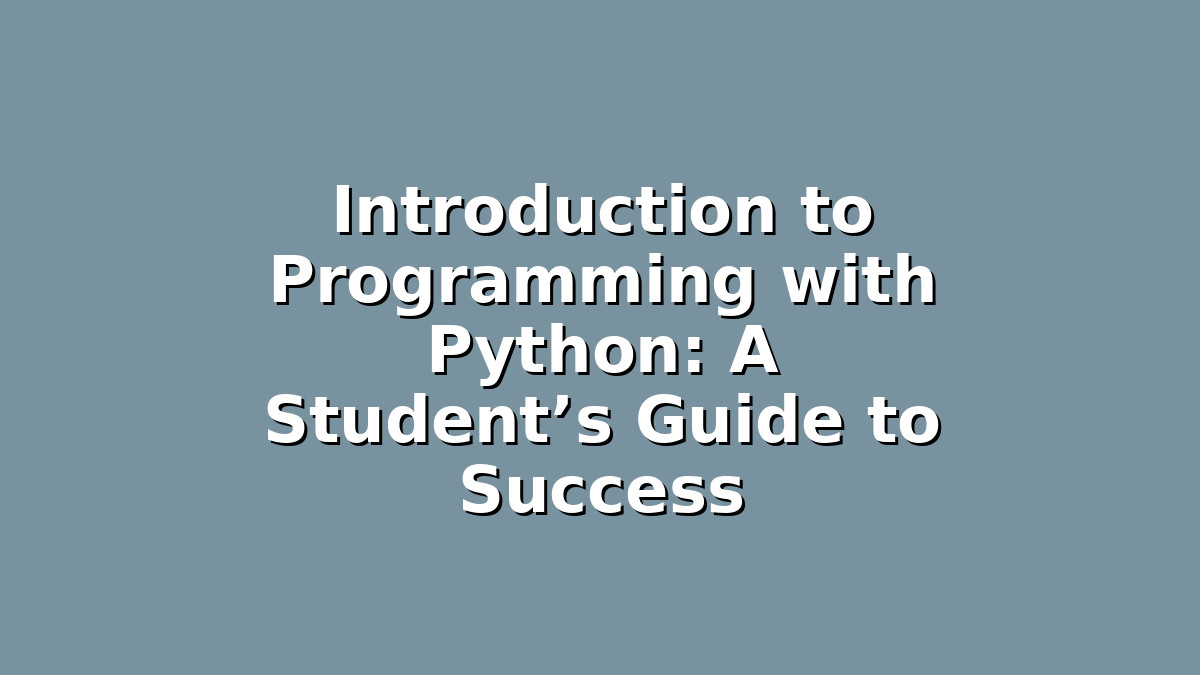Programming is a valuable skill that is increasingly important in today’s digital world. Whether you’re preparing for exams in computer science or simply want to expand your study toolkit, learning Python can open doors to new opportunities. Python is known for its simplicity and readability, making it an excellent choice for beginners. This article will introduce you to the basics of programming with Python and provide practical study tips to help you master the language effectively.
Section 1: Understanding Python Fundamentals
Before diving into coding, it’s essential to build a strong foundation in Python’s core concepts. Python is a high-level, interpreted programming language known for its clear syntax, which means that its code reads almost like English. This feature makes it ideal for students new to programming.
Start by familiarizing yourself with Python’s basic components:
– Variables and Data Types: Learn how to store and manipulate data using variables. Python supports various data types such as integers, floats, strings, and booleans.
– Control Structures: Understand how to control the flow of your program using conditionals (`if`, `elif`, `else`) and loops (`for`, `while`).
– Functions: Functions help organize your code into reusable blocks. Grasping how to write and call functions is crucial for writing efficient programs.
– Lists and Dictionaries: These data structures allow you to store collections of data and are central to many programming tasks.
Study Tip: Use interactive platforms like Codecademy, SoloLearn, or freeCodeCamp to practice these basics. The hands-on experience will reinforce your understanding and help you retain information better.
Section 2: Effective Study Strategies for Learning Python
Learning to program can sometimes feel overwhelming, especially when preparing for exams. Here are some study strategies tailored to help you succeed with Python:
– Break Down Problems: When faced with a programming problem, break it into smaller, manageable parts. This approach, known as decomposition, makes complex tasks easier and helps you write clear, step-by-step code.
– Write Code Daily: Consistency is key. Even spending just 20-30 minutes coding every day will improve your skills significantly over time.
– Use Visual Aids: Flowcharts and diagrams can help you visualize how data moves through your program and how different functions interact.
– Keep a Coding Journal: Document your coding exercises, challenges you face, and solutions you find. This journal becomes a personalized study guide and a useful tool to track your progress.
– Join Study Groups: Collaborating with peers encourages discussion, clarifies doubts, and introduces you to different problem-solving methods.
Study Tip: When practicing, write your own comments in the code. Explaining what each part does in your own words deepens comprehension and prepares you for exam explanations.
Section 3: Applying Python Concepts in Exam Preparation
Exams often test both theoretical knowledge and practical coding skills. Here’s how to apply Python concepts effectively during exam prep:
– Understand the Syntax and Logic: Memorizing syntax is important, but understanding the logic behind the code is crucial. Practice tracing the flow of code and predicting the output.
– Work on Past Exam Papers: Seek out previous exam questions or sample exercises. Attempting these under timed conditions builds confidence and helps identify weak areas.
– Debugging Practice: Learning how to identify and fix errors is a vital skill. Use Python’s error messages to troubleshoot your code, and don’t be afraid to experiment.
– Use Online Resources: Websites like Stack Overflow and Python’s official documentation can clarify doubts quickly. Bookmark useful tutorials and forums for quick reference.
– Simulate Exam Conditions: Try coding on paper or without an IDE to mimic exam settings where you may not have access to auto-complete or error-checking tools.
Study Tip: When reviewing your code, explain your logic out loud or teach a friend. Teaching is one of the best ways to solidify your understanding and discover gaps in your knowledge.
Conclusion
Learning Python programming is an achievable and rewarding goal for any student preparing for exams or looking to enhance their study skills. By focusing on core Python fundamentals, adopting effective study strategies, and practicing with real exam questions, you equip yourself with a skill set that extends beyond the classroom. Remember, persistence and consistent practice are your best allies on this journey. Embrace challenges as opportunities to learn, and soon you’ll find programming not only easier but also enjoyable.
Keep coding, stay curious, and believe in your ability to master Python!

Responses